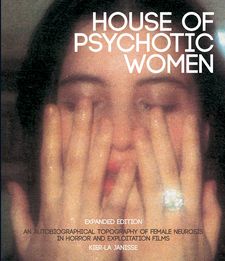House Of Psychotic Women (Expanded Edition) by Kier-La Janisse, FAB Press Ltd., ISBN 178 1 913051 21 1.
 |
| The 2022 edition of House Of Psychotic Women |
It’s difficult to believe that only ten years have passed since the original publication of Kier-La Janisse’s House Of Psychotic Women, such has been the book’s impact and so profuse the number of female-focused genre films made since. As one looks back, one sees more clearly than ever just how much progress has been made since, both in terms of gender relations in the industry and in regard to the prevalence of female voices in discussions of horror cinema. With respect for the person she was when she wrote it, and the impossibility of reconnecting fully with what the autobiographical aspects of its content meant to her back then, the author has decided to leave the main part of the text untouched, but this expanded edition contains around a hundred new film reviews.
It’s a valuable contribution to the archive. Though some of these films are well known and others have received diligent attention from the occasional genre-focused critic, many have been the subject of very little serious writing at all, and as such they may easily have gone under the radar of less obsessive fans. Few readers will make their way through the book without discovering some hidden treasure, and the same applies if one looks only at the new content. It should be noted that this is not marked as such, though it’s often obvious from dates of release. The additions do not consist only of new films but also of older ones accidentally omitted before. The sheer quantity and variety of what is addressed makes it wise, at any rate, to take notes as one reads, listing those films which one is most keen to try to track down, rather than having to try to find the reviews again subsequently.
If you were not familiar with the book in its original form, you’ll find a whole extra layer of content to enjoy. Ahead of the reviews, and interwoven with some of them, comes the narrative of Janisse’s own life, seen primarily from the point of view of her relationship with films. It looks at the personal events which made particular films appeal to her, and at the films which, in turn, shaped her perspective on the wider world. This section of the book is written with a rawness and honesty which is rare in memoir of any kind, acknowledging events and behaviours which she felt awkward about by the time of writing, never mind now, and it is all the more powerful for it. It also matters because of her openness about her own struggles with mental illness and socially denigrated behaviour, which is not only something discussed too little in society generally, but is a key factor in the aforementioned relationship with film, and with horror in particular.
Both this and the latter section of the book were pivotal in bringing to the fore a female perspective on horror cinema which had been largely absent before, at least outwith academia. This has contributed to a change in how many filmmakers look at their own genre work, and it gives voice to thoughts which many female and non-binary viewers will have had for decades when watching films which were only ever publicly discussed by men. Though many different interpretations flow from this, the key difference is in the point of identification: Janisse is not an outsider, like all those (often doomed) male heroes wandering into the domain of volatile and voluptuous anti-heroines; she is in there with the latter, inside their minds, inhabiting their skins. Her writing makes the reader understand the refuge they offer for those who, because they are mentally ill or because they are unwillingly constrained within a societal understanding of gender which is too narrow for them, can find representation nowhere else.
Though Janisse has intimated that she’s worried that the world has moved on so much that the world has now moved on so much that this aspect of the book will have lost its edge, she is prone to underestimate herself as a writer and to overestimate the ease with which average genre fans can gain access to material of this sort. House Of Psychotic Women may no longer by quite as revolutionary as it one was, but it still has a great deal to say, and one hopes that the new edition – launched at the Fantasia International Film Festival today – will bring it to the attention of a new generation of readers. Existing readers may well wish to update anyway because there is a good deal of fresh content here which makes it worthwhile.





















